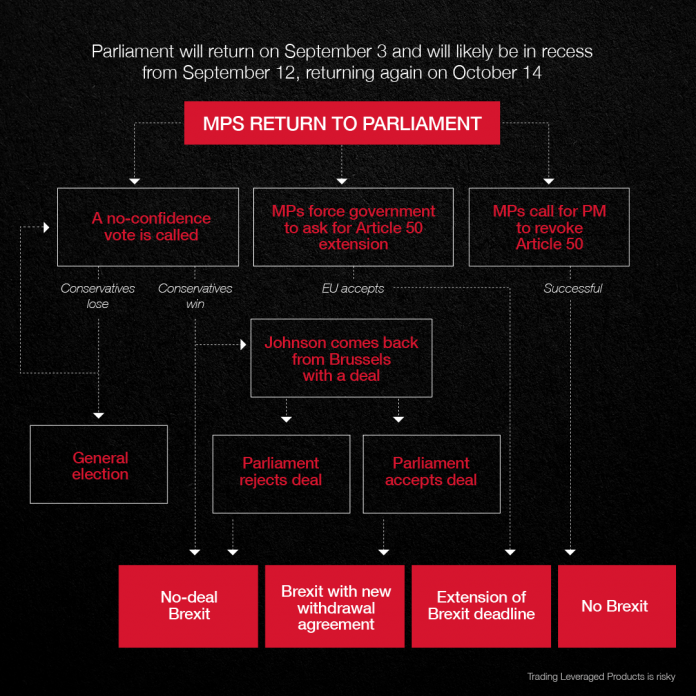Market participants are taking stock of UK Prime Minister Johnson’s move to suspend parliament for five weeks as a means to limit the time available for opposition parties to take the no-deal Brexit option off the table.
Parliament will take an extended recess from September 10, just seven days after it reopens after the summer recess, and reopen on October 14, just 17 days before Brexit day. The move is in the rules, and the Queen has approved it (as is the normal procedure), but controversial given the timing ahead of the Brexit deadline.
Consequences of Johnson’s move
As a consequence of Johnson’s move, there is an increased likelihood that no-to-no-deal members of parliament will call a confidence vote in an attempt to bring down the government rather than attempt to pass legislation preventing no-deal.
If a vote of confidence went against the government (the opposition have the numbers), and if an interim government fails to form (which would look likely given the unpopularity of Labour leader Corbyn), then a new general election would be triggered.
Aside from a question of whether Johnson would still be able to trigger Brexit before an election was organised in this scenario (he might be able to), an election would be tough to call. The prime minister’s Tory party were polling at about 31% last week, while the principal opposition, Labour, were down at around 21%. In the mix would be the Brexit Party and a possible coalition between it and the Tory Party, which might be enough under the UK’s first past the post rules to see them win with a working majority. But anti-Brexit parties, including the Liberal Democrats, the Scottish National Party and the Green Party, would likely form an alliance and be a considerable force.
Other than that, another two possible scenarios in an attempt to stop Boris, as Tim Bale, professor of politics at the Queen Mary University of London stated, are:
- Parliament to push a piece of legislation that mandates the government to ask for an extension of Article 50. Given that Johnson’s majority in parliament is currently just one MP, that attempt could pass if pro-Remain conservatives defect from the party.
- Parliament to pass legislation that calls for the PM to revoke Article 50 altogether, stopping Brexit. This is less to happen.
Click here to access the Economic Calendar
Andria Pichidi
Market Analyst
Disclaimer: This material is provided as a general marketing communication for information purposes only and does not constitute an independent investment research. Nothing in this communication contains, or should be considered as containing, an investment advice or an investment recommendation or a solicitation for the purpose of buying or selling of any financial instrument. All information provided is gathered from reputable sources and any information containing an indication of past performance is not a guarantee or reliable indicator of future performance. Users acknowledge that any investment in Leveraged Products is characterized by a certain degree of uncertainty and that any investment of this nature involves a high level of risk for which the users are solely responsible and liable. We assume no liability for any loss arising from any investment made based on the information provided in this communication. This communication must not be reproduced or further distributed without our prior written permission.



















